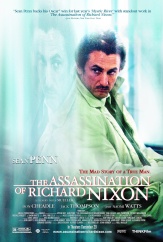|
The Assassination of Richard Nixon |
| |
 |
USA/Mexico, 2004. Rated R. 95 minutes.
Cast: Sean Penn, Naomi Watts, Don Cheadle, Jack Thompson, Brad Henke, Nick Searcy, Michael Wincott, Mykelti Williamson, April Grace
Writers: Niels Mueller, Kevin Kennedy
Original Music: n/a
Cinematography: Emmanuel Lubezki
Producers: Alfonso Cuaron, Jorge Vergara
Director: Niels Mueller
LINKS
|
" ho are these men that keep us waiting at their feet?” asks Sean Penn in The Assassination of Richard Nixon, railing against the power structure supposedly keeping him down.
ho are these men that keep us waiting at their feet?” asks Sean Penn in The Assassination of Richard Nixon, railing against the power structure supposedly keeping him down.
That's not the question posed by the film, though. The question is, who are these men who want to kill presidents? Such men include Lee Harvey Oswald, John Wilkes Booth, and William McKinley's assassin Leon Czolgosz—but these aren't the weirdest examples.
Consider: In 1835, Richard Lawrence tried to shoot Andrew Jackson because he believed Jackson was preventing him from taking his rightful place as the King of England. In 1881, Charles Guiteau shot and killed James Garfield in a railroad station because he had convinced himself that Garfield somehow owed him a government appointment. In 1981, John Hinckley shot and wounded Ronald Reagan because he hoped to impress actress Jodie Foster. And in 1974, Samuel Byck attempted to hijack a commercial airliner so he could crash it into the White House and kill Richard Nixon.
They have common traits, most of these men. They have poor social skills. They are unable to hold jobs. They believe the system prevents them from moving forward in life.

Sean Penn is a disgruntled salesman who hatches a bad plan in The Assassination of Richard Nixon. |
Samuel Byck (Sean Penn), renamed “Bicke” in the film in acknowledgement of the story's speculative elements, fits the profile. He's a lousy salesman. He can't let go of his failed marriage to Marie (Naomi Watts). He wears a brace on one foot. He's not that bright, but he has a lot of rage. Much of what Sam says makes sense—the system is unfair, many jobs do require people to give up their dignity, and the Land of Opportunity is a myth for countless Americans—but the more we get to know him, the more we realize that the ills of society have nothing to do with his lack of achievement. Sam is a screw up. “I'm so tired of this,” sighs Marie as Sam launches into a rant. She knows the drill. Everyone around him knows the drill.
Because Richard Nixon survived to resign in scandal, Sam's failure is a given. The Assassination of Richard Nixon, despite its evocative title, is not a suspense thriller. It's a character study, and a superb one.
To help externalize Sam's inner world, director/co-writer Niels Mueller uses the recurring device of Sam recording audio tapes to explain his actions, which he plans to send to Leonard Bernstein (whom, of course, he has never met). The recordings are not a gimmick, though. The real Byck did make such tapes and did send them to Bernstein and others. Sam relates how alone he feels, and explains how that's exactly what “they” want—for everyone to feel divided and alone. “What happened, Mr. Bernstein, to the land of plenty?” he asks. He even identifies with the Black Panthers.
Sam has a highly developed sense of justice, but not a highly developed brain. This results in dozens of opportunities for laughs that both emphasize Sam's inadequacy and lighten this otherwise heavy load of a film. Sam pays a bizarre visit to the Black Panthers and proposes renaming them “the Zebras” in order to include oppressed white people such as himself. His boss Jack Jones (Jack Thompson of Breaker Morant) gives Sam books on positive thinking, and delivers a sincere but hilarious lecture on how Nixon is the greatest salesman of all time.
Sam obsesses about society's lies, and to him, selling equals lying. His only friend Bonny (Don Cheadle) contradicts him—“It's not lying; it's business”—and goes to deal with an asshole customer with a wicked smile. That's the difference between Bonny and Sam. Sam is utterly incapable of accepting life's contretemps, let alone laughing about them. Nor does Sam have the patience to wait for the results of a small business loan application. He compulsively undermines himself instead. As Mueller's cameras observe dispassionately, relying on ambient lighting to cultivate a documentary mood reminiscent of a ‘70s film, Sam's slow burn intensifies as he conceives his ill-advised plan to shake the system to its core.
Few things are as exciting as watching a great actor successfully turn off the star wattage and don the skin of an utterly weak, insignificant person. Al Pacino did it in Donnie Brasco, and Penn does it here in what might be his greatest performance yet. To play this kind of role, the actor must swallow his pride and allow other actors to dominate him. Watts, Thompson, and Michael Wincott (The Crow, Alien: Resurrection), in his one scene as Sam's brother, do so masterfully. While there's not much of a story here, and there's certainly nothing for the crowd who believes films ought to be uplifting, Penn definitely answers the question of who these men are who decide to kill presidents. Or at least who one of them was.
Review
© December 2004 by AboutFilm.Com and the author.
Images © 2004 ThinkFilm. All Rights Reserved.


